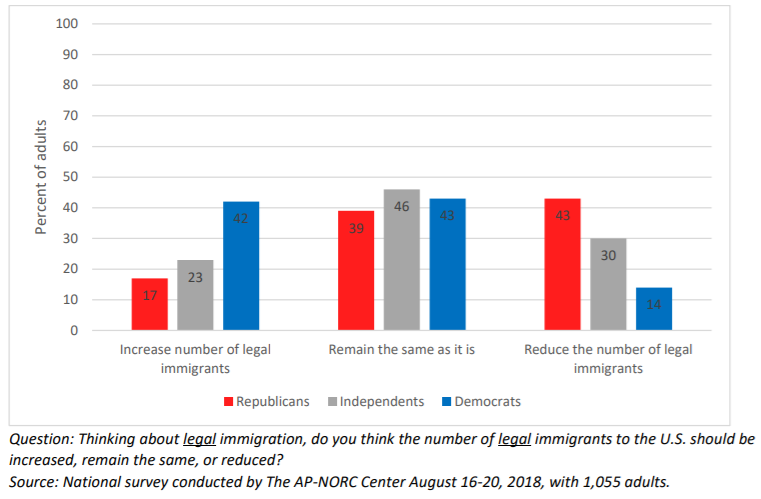
In May, U.S. Attorney General Jeff Sessions announced a “zero-tolerance” policy toward people entering the United States illegally. It resulted in over 2,000 children being separated from their parents before the policy was reversed on June 20, 2018.1 Asked how the Trump administration is doing in its efforts to reunite families separated at the border, 58 percent say the administration is doing too little, 33 percent say it is doing the right amount, and 8 percent say it is doing too much. Majorities of Democrats (85 percent) and independents (64 percent) say the administration is doing too little, while a majority Republicans say it is doing the right amount (64 percent).
U.S. Immigration and Customs Enforcement, the agency responsible for enforcing the country’s immigration laws and known as ICE, was at the forefront of much of the coverage of family separations and is seen more negatively than positively overall. Thirty percent say they have a favorable view of ICE compared to 37 percent who hold an unfavorable view. A substantial number – 33 percent – say they have no opinion on the agency. Fifty-seven percent of Democrats view ICE unfavorably, while 57 percent of Republicans view it favorably. Independents most often say they have no opinion (46 percent).
Protests have emerged calling for abolishing ICE, but few Americans support such a change. Just 24 percent of the public supports abolishing the agency, while 40 percent oppose and 34 percent have no opinion. In this instance, there is little difference across partisan lines, with similar minorities of Democrats, independents, and Republicans favoring abolishing the agency.
When it comes to the level of legal immigration into the United States, 42 percent say the number of immigrants should remain the same as it is now, 29 percent say it should be increased, and 28 percent say it should be reduced. Republicans are most likely to say the numbers should be reduced, while Democrats are most likely to say they should be increased. Still, about 4 in 10 of all three groups say levels should remain as they are.

A majority of Americans give the president negative marks for how he is handling the issue of immigration overall. Sixty-one percent disapprove of his performance on the issue compared to 38 percent who approve. This number has remained virtually unchanged since February of this year.
The nationwide poll was conducted August 16-20, 2018 using the AmeriSpeak® Panel, the probability-based panel of NORC at the University of Chicago. Online and telephone interviews using landlines and cell phones were conducted with 1,055 adults. The margin of sampling error is plus or minus 4.2 percentage points for all respondents.



